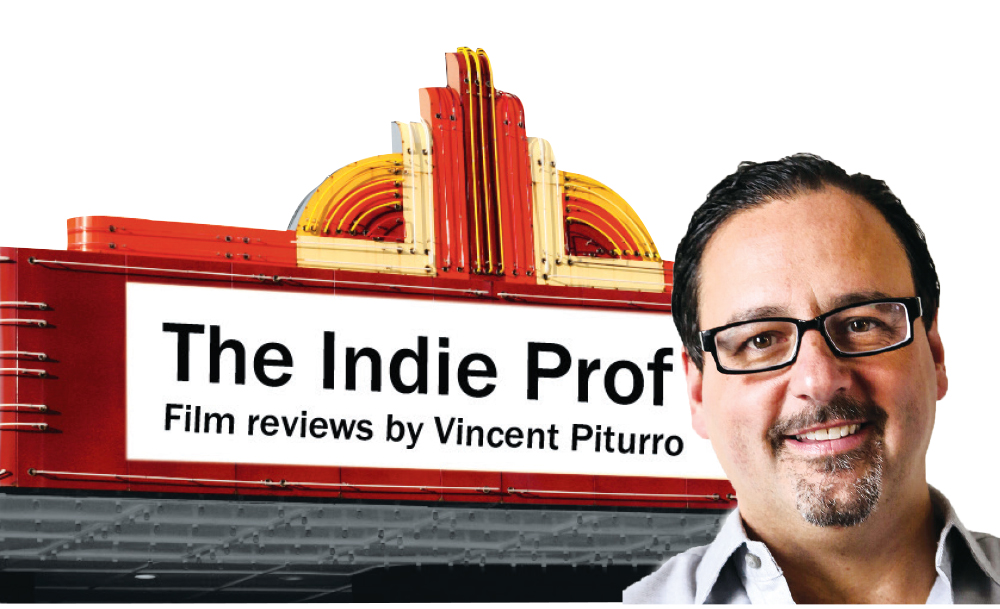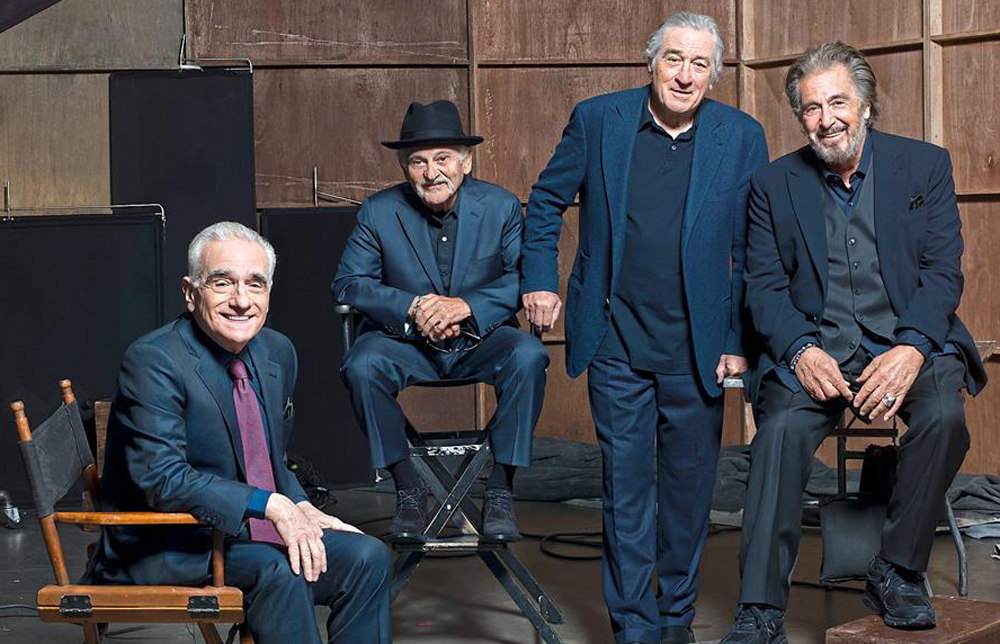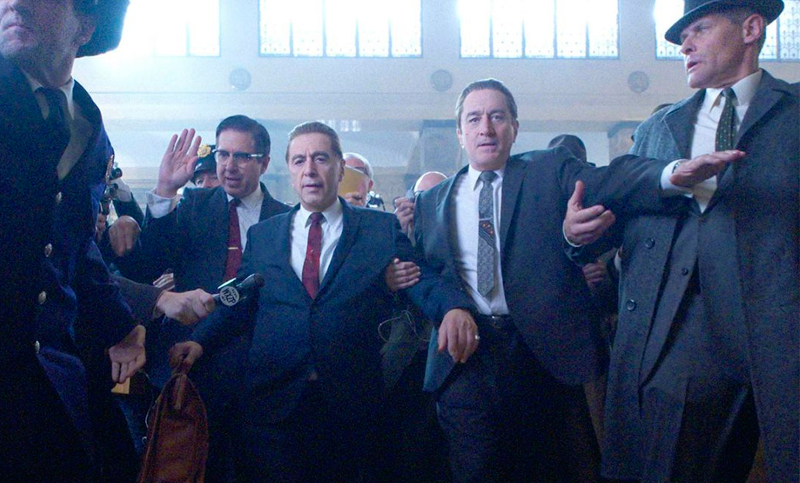
Each month, the Indie Prof typically reviews one or more films from the theater or an instant-streaming service. Follow “Indie Prof” on Facebook for updates about film events and more reviews.
The Irishman (Netflix)
Martin Scorsese is the best living director in the world, and his newest film confirms that status. Given $100 million+ and complete control by Netflix, Scorsese was afforded the freedom to make the film his way—a rare gift, even for a director of his status. The results are obvious: The Irishman is a sweeping epic and a virtuoso performance by a giant among giants in the film industry. In his over 50-year filmmaking career, this will stand as one of his best.

The men behind The Irishman.
The narrative centers around the life of Mafia hit man Frank Sheeran (Robert DeNiro) and chronicles his life from his time as a truck driver in post-WWII Pennsylvania, to his rise in the local Mafia with boss Russel Bufalino (Joe Pesci), to his association with legendary organized labor leader Jimmy Hoffa (Al Pacino) in the 60s and 70s, up until, and after, Hoffa’s death in 1975. The movie posits that it was Sheeran who killed Hoffa.
The film is based on the book I Heard You Paint Houses by Charles Brand and clearly announces it is “based on real life.” Whether everything in it is true or not is up for debate—and theories abound. The FBI maintains that Hoffa’s death is an unsolved case, and there is evidence for all sorts of (im)plausible accounts of the events. My assertion is that the film tells a story; it is one person’s take. On to the film.

The Irishman
Wait, there is another controversary: the fact that the film was made by Netflix means that it only had a very limited theater run. As the online giant increases in-house production, theater owners (and the Oscars and many other directors…) have been fighting over if/how long those films should run in theaters. The Oscars require a theater run, and cinephiles wished for the normal period of (at least) two months before moving online. Netflix compromised with a limited theater release shorter than theater owners wished. Here in Denver, the film played for only a week, so I hope you got to see it on the big screen. Now on to the film.
This is Scorsese’s 32nd feature film (depending on how you count it), and he has made dozens of other shorts, TV episodes, and music videos. He literally never stops working. While he is best known for his Mafia films, the truth is that of his 32 features, only 5 have been about Mafia: Mean Streets (sort of), Goodfellas, Casino, The Departed (sort of), and now, The Irishman. He also made a film about a single mom in the southwest, Alice Doesn’t Live Here Anymore (1973); a musical, New York, New York (1977); a black comedy, The King of Comedy (1982); a period piece, The Age of Innocence (1993); a film about the Dalai Lama, Kundun (1997); a kid’s film about the early days of cinema, Hugo (2011); and, oh yeah, Taxi Driver (1976) and Raging Bull (1980). He is one of the most versatile directors in film history and hasn’t always resorted to violence. Now, on to the film.
But first, there is the matter of the run time: at 3. 5 hours, it has received some criticism for being overly long, and Anna Paquin’s muzzled performance, and the controversy over Scorsese’s comments about The Avengers, and….
You get the point: with a Scorsese film, there is so much other “stuff” that the actual film gets lost in the ether. Wade through it and sit in awe. It has all the trademarks of Scorsese at his best: stunning cinematography; brutal realism; rapid-fire editing punctuated by long takes of intimate conversations; edgy dialogue; ridiculously good performances by DeNiro, Pesci, and Pacino (Pesci in particular will surprise and delight); memorable supporting performances by dozens of first-rate actors; period music; gangland shootouts; epic storytelling that traverses decades and continents; freeze frames; screen titles; and to add to his technological repertoire, a digital de-aging process that makes the older actors look younger in the flashbacks. Scorsese has always been a master of the art as well as the technology, and this film is no different.
The film also takes a harsh view of its subjects, and even minor Mafia characters get tagged with when they were killed and how. It is not melancholy about its violence and its male-dominated brutality. No one is spared, which brings us to what I see as the central theme of the film: it is a violent patriarchal world in which we live, and there seems to be neither a beginning nor an end. The opening scene really tells all: in a very Scorsese shot, the camera tracks and meanders down a long hallway to 60s pop on the soundtrack. But the shot doesn’t end with a flourish (as it did famously in Goodfellas); it ends with a whimper as we meet Sheeran as an old man in a wheelchair, alone in a senior home. We don’t love the characters we meet for the next 3.5 hours; we despise them. This is clearly on Scorsese’s mind, especially since he had a hand in glorifying them over the decades. This film demystifies and de-romanticizes much of what people think about Scorsese’s work, and the only melancholy we feel is that Scorsese, DeNiro, Pesci, and Pacino are also aging, and we don’t get them for very much longer. That is also clearly on his mind.
Two local screenings of note this month:
Hitchcock’s To Catch a Thief at 2pm Sunday, January 12 at Sam Gary Library.
The Princess Bride at 6pm Friday, January 24 at The Cube in Northfield. I will be there for an intro and discussion. See you there!
Vincent Piturro, Ph.D., is a Professor of Film and Media Studies at Metropolitan State University of Denver. He can be reached at vpiturro@msudenver.edu. And you can follow “Indie Prof” on Facebook and @VincentPiturro onTwitter.




0 Comments